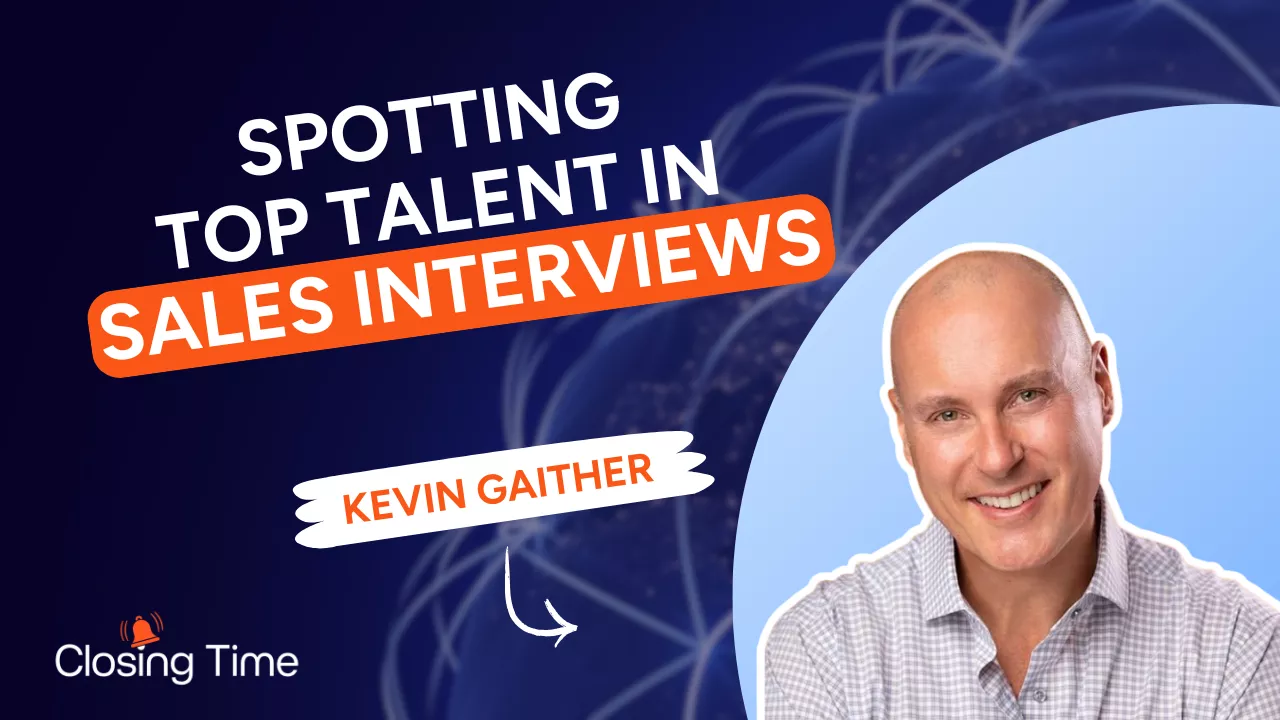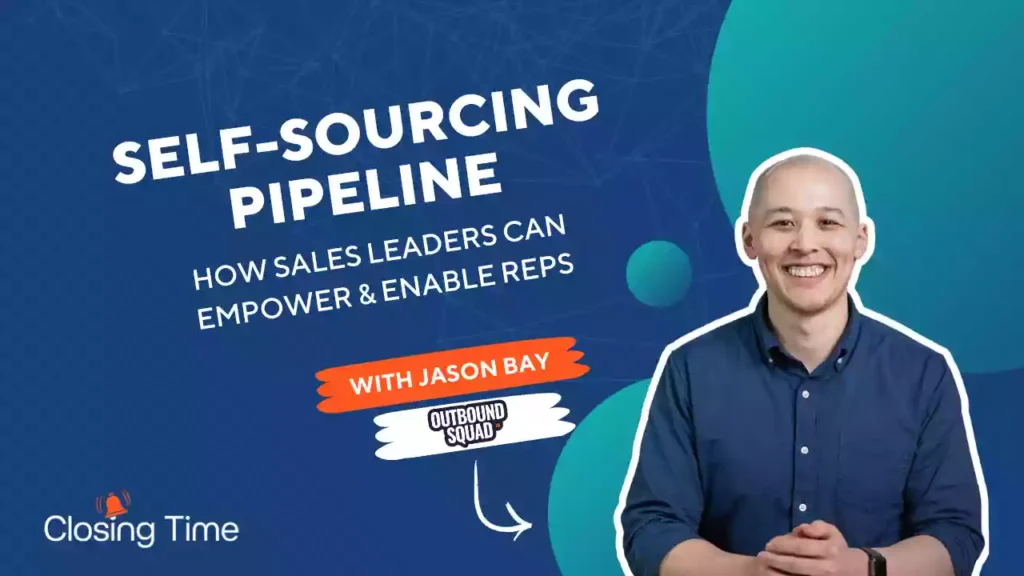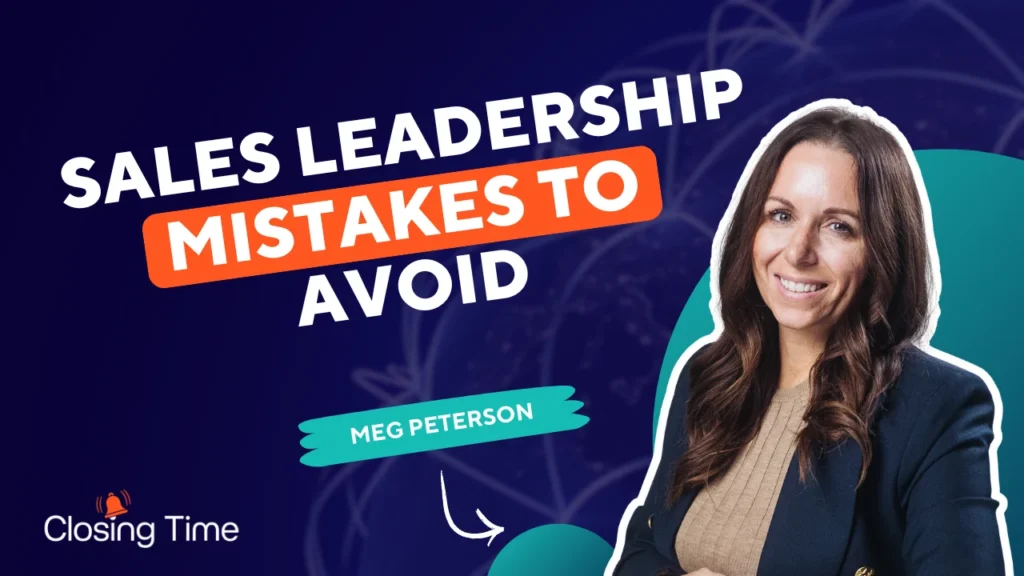Gearing up to hire for your sales team.
Learn the essential traits to look for during the interview process
on this episode of Closing Time.
Thanks for tuning in to Closing Time, the show for Go to Market Leaders.
I’m Val Riley, head of marketing for Insightly CRM and Unbounce.
Today I am joined by Kevin Gaither.
He is CEO of Inside Sales Expert.
Welcome to Closing Time. Kevin.
Thanks for having, having me.. I really appreciate it.
And, happy to share my, my wisdom along with my mistakes.
Great, I love it.
So let’s go back in time to 2007.
You had shared with us that you had the very difficult
task of doing a large scale layoff of sales people.
Take me back to that time.
What was going through your mind?
Yeah.
Much like, every and every, most any sales leader that’s out there.
I wasn’t trained on how to interview.
It was just sort of.
We need to hire, 30 more.
More people as quickly as possible.
90 days actually, is what the number was.
And, good luck. Do your best.
And I didn’t get any sort of training whatsoever.
And then, after about six months after I made those hires,
the VP of sales said, oops, we made a miscalculation.
And, and we need to, like, let all these, a bunch of these,
these people go and went from 30 down to, like, 12.
Look, if you’ve had to fire
one person, it’s awful having that, you know, get rid of 18 people was awful.
And even though it wasn’t my fault, and this is important for your audience,
it wasn’t my fault, but I felt incredibly guilty.
Awful about having to lay all these people off.
And I wanted to do my my best, Val, moving forward
so that I could do my part to make sure that that that never happened again.
That I could be, as good of a hiring manager as, as as possible.
Well, I mean, I love that, Kevin, because really,
everything is a learning experience.
Especially when those things happen early on in your career.
And I like how you’ve been able to,
you know, zero in on this and flip it to a positive.
So you kind of came up with like six traits that you thought
were essential for success in sales people.
First of all, how did you narrow it down to six?
Ha ha ha.
Well, there was definitely a lot of trial and error.
Just to be clear, this is 2007. Okay?
So I’ve had a lot of time.
And at that time, I went on a quest.
I wanted to teach myself
how to become a better interviewer and hire and selector of of salespeople.
And I read books like top grading, top grading for sales.
Never Hire a Bad Salesperson Again by Doctor Chris Croner.
All three of those books and consumed as much as I possibly
could and came up with my own, hiring benchmark
against which I wanted to hire future, future salespeople.
And those six traits probably weren’t on the list, you know, to begin with.
But over time and after I took over sales
teams, Val, hired more salespeople, built new sales teams,
I realized that these six characteristics were evergreen.
Doesn’t matter if you’re hiring for SDRs experienced enterprise salespeople, inside
salespeople, middle market salespeople, even customer success if they have quotas.
These six traits, are ubiquitous.
They are evergreen. You.
I believe firmly that you would always look for these
if you’re hiring for any sort of quota carrying role.
Yeah.
So it’s interesting that you mentioned that because you’re
not focusing so much on, for example, like an enterprise
AE versus an SDR might need something different.
You’re really just focusing in on the traits.
So it’s not about like years of experience
necessarily, but who they really come across as people.
Yes. And
and to be clear, Val,. I separate those out. Yes.
I can have requirements of history and background and things like that.
But the characteristics and the traits of the person.
Those are something separate entirely.
And I the those are evergreen. Yes.
Of course, if I’m hiring an enterprise salesperson,
I want a lot more experience and complex selling compared to an SDR
right out of college or high school or something like that.
So yes, great, great, great distinction between the past track record
and these behavioral traits.
All right.
So the big reveal.. I think we’re all ready.
And and you’ve been very generous in your. LinkedIn posting by sharing this wisdom.
But the six traits I’ll go ahead and list them are coach ability resourcefulness
continual learning need for achievement, competitiveness.
And I think my favorite might be optimism.
So clearly these really resonated with you.
I’d like to dive into a couple and figure out how you would ascertain
a person’s, how they embody those traits while just on a job interview,
because it’s really just a such a short time we spend with folks.
So, for example, why is the need for achievement on your list?
And how would you determine in an interview process
if someone has a high need for achievement?
Yeah.
And by the way, the central premise around these six, these are characteristics
that people show up with you can’t train these.
These aren’t skills.
It’s not like,
you know, teaching somebody how to type, you know, or use a different CRM platform.
So the thing that resonates the most in the common denominator amongst those is
they either have them or they don’t.
And because these are these are skills and behaviors
during those in any of the interviews that you’re going to have,
you can utilize behavioral interview questions
to figure out whether or not they
they possess these these characteristics and what you’ll hear
through the rest of these questions when you get to when you ask me
is it’s “tell me about a time when,” okay.
And I want to make a really important distinction,
because this is a mistake that I made when I didn’t know any better.
And a lot of sales leaders make this mistake to this day.
They ask about future.
How would you handle a situation that looked like this
if you were in this situation?
What would you do?
Val, that is not nearly as important
as what they have done in exact situations like that.
You know, in the in the past. So need for achievement
is what to me, one
of the six one of the most important because this demonstrates, you know
well the definition in my my, my template
that I offer for free is a burning need to achieve.
They’re ambitious, They’re disciplined.
They’re focused on advancement.
They’re willing to do things
that others will not do in favor of their of their goals.
These people work their butts off. Okay.
And and so a couple of the questions that I would ask, some of my favorites.
What kinds of sacrifices have you had to make in your personal life
in favor of success in your business life another great question.
Tell me about a few times when you’ve exceeded expectations
or went beyond the call of duty.
These are these maniacs that like that.
Well, you know, you tell them to do one thing
and they then do 50% more than that.
And they weren’t even asked to do those things.
If you have somebody like that on your sales team
where their motor is just constantly running
and they’re always looking to do more and do better,
oh my gosh, you’re cooking with gas.
Well, when you have somebody that
whose motor already runs like that, they always want to be moving forward.
They’re ambitious.
They want to keep, you know, and they work their butts off.
And these are real questions.
Tell me about a time when
and that
they can tell you real stories with details and times.
Right now you’re looking for the Energizer. Bunny is what it sounds like.
Yeah.
And far fewer between far and few between.
Admittedly.
I do love this approach because, I mean,
if you’re asking something future state, people might answer in a way of how
they want to show up for you in this role, but versus the reality of how they’ve
shown up in the past in roles is really what you’re getting to the core of.
You’re 100. You are 100%.
They’re looking for the right answer
rather than telling you how they actually behaved.
100%. Great summary, Val. you’re right.
It might just be answering of what they think the interviewer wants to hear.
And as a young interviewer or inexperienced interviewer,
it can be very easy
to fall into a trap and be like, well this person is just saying everything, right.
But they really maybe can’t back it up.
Anyway, let’s move on because we have, a couple more to go into
because I like
how we’re being tactical here and you’re actually giving examples of questions.
So one of those traits was competitiveness.
So again, I’ll ask you what types of questions
would you ask somebody to determine if they are truly competitive or not?
Yeah. Very good. And I.
And I’m going to hit a nail on the head.
By the way, there’s sales leaders out there that also misconstrue,
competitiveness with athletes.
These are not the exact same thing.
Furthermore, they can be incredibly exclusionary.
There is a lot of people that never played competitive sports in their lives,
but they were incredibly, you know, competitive.
And so you want to make sure that your mind is open.
Second, here’s a really awful question, Val,
which would, do you hate to lose or love to win?
This is the one that I love to beat up
on LinkedIn all the time, and it gets everybody all fired up.
That is the dumbest question because once again,
they’re they’re looking what’s the right answer?
They’re they’re trying to figure out the right, you know, the right answer.
So a couple of questions that I like to ask.
When was the last time you were competitive.
And the, the best and most competitive people answer that question.
They’ll look up and to the left a little bit, and then they’ll go,
well, do you mean like personal or at work?
Which do you mean?
And when they say that,
that’s fantastic, because in their minds they are always competitive.
They’re always eyeing their peers.
Everything is a competitive situation where they’re playing.
They can be playing with their kids or playing FIFA
with their friends, but yet they’re always competitive.
And you want to hear multiple recent stories.
Yesterday, last week, both business and personal.
Because I’m not separating,. I just want to look for a trait.
Are they competitive?
Tell me what about works?
And you’ll hear salespeople say,
well, you know, to me, in sales, you always have to be competitive.
Oh, great. Well, then how about yesterday?
Tell me what you were doing yesterday.
That leads me to believe that you were you were competitive.
So real recent, stories.
I appreciate that because, you know, you can be a very competitive person,
but just not be very coordinated and still,
you know, it’s your competitiveness shines through in areas
other than being an athlete.
So just want to commend you for separating those two.
Oh, you did thousand percent.
Percent. By the way, there was a quick story.
A woman that I hired never played competitive sports in her life,
but she was a front of the class yoga person.
Her. Her name was, Pauline, by the way.
I’ll never forget that, because that was a perfect
example of somebody who never played competitive sports.
And this woman, she’d be doing the whatever vinyasa pose,
and she was telling me a story, how she had opened her
eyes and looked left and look right to see who was falling down.
And when they would fall down, she would be like, yes, I’m winning.
And I thought, what a great example of
if I was just looking for sales athletes,. I never would have interviewed Pauline.
As the front of the class yoga person.
Well, on behalf
of all the uncoordinated people out there,. I will just thank you for that.
Let’s do another one.
And again,. I think this one is my favorite,
because you say optimism is a very important trait in sales.
So why optimism?
And tell me how you would ask questions to see if someone was optimistic.
Yeah. So, optimism. This is thick skin.
You know, the definition, you know, provides the body armor to withstand
the inevitable, inevitable rejections of selling credits themselves with success.
But doesn’t take defeat personally.
Doesn’t take defeat personally.. Really important. There.
Okay, so tell me about the worst customer problem you’d ever, you ever faced.
How did you recover from that situation?
Of course those two pieces go together, right?
Tell me about the worst customer problem you ever faced.
How did you recover from that and what you’re looking for is it quickly
put the situation in perspective and just got back on the phones
and started moving forward and came back stronger after after tough, tough times?
Think back to the last time you lost a deal, you know,
when was the last time you lost the lost a deal?
Oh, my gosh, it was last month.
What did you do to recover from that?
Like once again, quickly put it in perspective, bounce back,
by, you know, working on another sale or getting back on the phone.
The best, the best salespeople that I’ve interviewed that have high
their boatloads of of optimism, Val, they’re the ones that say.
Yeah, I got
my butt handed to me, lost this huge deal to a customer.
I went into my boss’s office,. I vented a little bit and debriefed
with my boss about what I did wrong and what I could have done better,
and then I and then I say, well, what do you do next?
I went back to my desk and got back on the phone and they’re confused.
And they’re confused.
What else would you do if you have high optimism,
what are you going to do, wallow in your tears?
You know, the other stories are. I lost the bad stories.
I lost to sale, and I was so distraught. I had to take the rest of the day off
and take a mental health day the next day.
I had no tolerance for that stuff.
I had none whatsoever.
And I’m not saying I don’t have tolerance for mental health.
What I’m saying is, if you’re in sales and you get your butt
handed to you and you can’t learn how to recover from that,
get off the phones.
You really should not be in sales if you don’t have thick skin. So.
So that’s where optimism and once again,
I don’t care if you’re an enterprise salesperson,
customer success rep, an SDR,
or your SMB salesperson,
everybody has to deal with rejection in some of some kind in sales.
It’s why it’s one of the fundamental traits against
which I would always look for, for salespeople of any kind.
I appreciate that perspective because it is important.
There are times.
I mean, looking back on my career,. I’ve survived a couple of recessions.
And there are times where sales is just a little bit easier
because you’ve got some economic tailwinds.
And then you come to a point like, you know, 2008 or, you know,
even 2022 or 2023 where you kind of lose that tailwind.
And if the folks that sales people that have been coasting along
because of some nice economic conditions
are really the ones that struggle during those periods.
I couldn’t have said it better myself.
Like. Right.
Right on.
Like when things get tough and you’re like, oh, it’s so hard now.
Now you’re whining and moaning about how high your quota is.
Yet you benefited from the upsides, you know, along along the way.
it’s, you know, career in sales is going to span ten, 20, 30 years.
And you’re going to have to realize that there’s ups and downs.
So I think you’re going to be leaning on that optimism up quite a bit.
No question. Yeah.
No no no question about it. Yeah.
Thick skin thick thick skin. Absolutely.
So I really feel like we’ve helped some sales leaders today
who are getting prepped for their next candidate interview.
You have a great resource that takes sales hiring one step further.
Can you tell us about the 77 questions which I love?
That number, 77 questions to ask salespeople.
Where can folks get that resource and tell us a little more about it?
Yeah.
If you just go to insight sales expert.com, and you’ll see my free guide
session, section.. There’s like ten plus guides in there.
But the most popular down download is the 77 salesperson interview questions.
These are literally. I didn’t mean it to be 77.
It end up turning out to be 77, which is lucky for me.
And it’s broken into like 20 different,
characteristics with interview questions in each of those,
including the six that we’ve mentioned, you know, mentioned here.
Of course, as a plug and play interview guide
that a sales, sales leader or hiring manager can download today
and, and start using these questions immediately
that I have used over the last 25 plus years
of hiring salespeople, making mistakes, and learning from those mistakes.
So inside sales expert.com look on my free guide session, section
and you’ll see the 77 salesperson interview questions.
Perfect.
I also recommend,. Kevin out there for a follow on LinkedIn.
He does share a lot of great information on LinkedIn, so please check him out.
Thank you.
Thank you so much for joining us, Kevin.
Really appreciate you giving us the time today.
My pleasure. Happy to be on here.
And hopefully I was helpful to, some people in your audience.
Thanks again.
Val. sure, thanks to all of you for tuning in to Closing Time.
Remember, you can get these episodes delivered
right to your inbox by clicking the link in the show notes.
We will see you next week.




